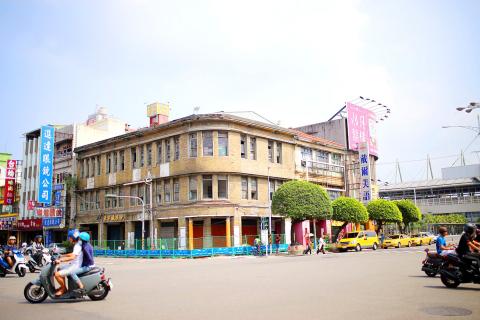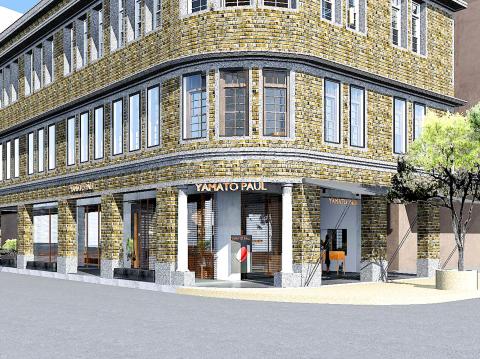The proprietor of Pingtung City’s colonial-era former Yamato Hotel (大和旅社) said he would be refurbishing the building without applying for public subsidies.
Built in 1935, the Yamamoto was a Japanese luxury hotel situated near Pingtung Railway Station that served the colonial military and business elite. The post-WWII slump hit the hotel hard and it closed its doors in 1999 after decades of decline, selling the property to a cake shop.
In 2014, the Pingtung County Government listed the former hotel as a cultural heritage site.

Photo: Chiu Chih-jou, Taipei Times
Hsu Yuan-shun (許源順), chairman of Christmas lights manufacturer Yuanshuan Industries Co and a self-described lover of old buildings, said he purchased the deeds for NT$90 million (US$2.9 million) from the building’s 30 owners.
Hsu said that while he could apply for a subsidy to cover 95 percent of the cost of restauration under the Cultural Heritage Preservation Act (文化資產保存法), prefers not to have to deal with government red tape and feels that following legal requirements for restoring a heritage site would impose unnecessary delays.
He said he would rather repair the structure as soon as possible on his own dime.

Photo courtesy of Yamato Hotel
The restoration project began on Aug. 8 and would involve input from Divooe Zein Architects executive architectural designer Divooe Zein (曾志偉) and historical structure restoration expert Lin Shih-chao (林世超), he said.
Repairing the old structure has proved harder than anticipated, Hsu said, adding that installing modern elevators, bathing facilities and lighting has been a challenge.
The ceramic tiles used in the original structure, which he is trying to source, are mostly out of production and their manufacture has become something of a lost art, Hsu said.
After refurbishment, the building is to feature a coffee house on the first floor, a hostel on the second floor and an activity space on the first floor, he said.
“Restoring the hotel is not about earning money, but about leaving something for future generations,” Hsu said, adding that he hopes the building will become self-sustaining.

US climber Alex Honnold is to attempt to scale Taipei 101 without a rope and harness in a live Netflix special on Jan. 24, the streaming platform announced on Wednesday. Accounting for the time difference, the two-hour broadcast of Honnold’s climb, called Skyscraper Live, is to air on Jan. 23 in the US, Netflix said in a statement. Honnold, 40, was the first person ever to free solo climb the 900m El Capitan rock formation in Yosemite National Park — a feat that was recorded and later made into the 2018 documentary film Free Solo. Netflix previewed Skyscraper Live in October, after videos

NUMBERS IMBALANCE: More than 4 million Taiwanese have visited China this year, while only about half a million Chinese have visited here Beijing has yet to respond to Taiwan’s requests for negotiation over matters related to the recovery of cross-strait tourism, the Tourism Administration said yesterday. Taiwan’s tourism authority issued the statement after Chinese-language daily the China Times reported yesterday that the government’s policy of banning group tours to China does not stop Taiwanese from visiting the country. As of October, more than 4.2 million had traveled to China this year, exceeding last year. Beijing estimated the number of Taiwanese tourists in China could reach 4.5 million this year. By contrast, only 500,000 Chinese tourists are expected in Taiwan, the report said. The report

Temperatures are forecast to drop steadily as a continental cold air mass moves across Taiwan, with some areas also likely to see heavy rainfall, the Central Weather Administration (CWA) said. From today through early tomorrow, a cold air mass would keep temperatures low across central and northern Taiwan, and the eastern half of Taiwan proper, with isolated brief showers forecast along Keelung’s north coast, Taipei and New Taipei City’s mountainous areas and eastern Taiwan, it said. Lows of 11°C to 15°C are forecast in central and northern Taiwan, Yilan County, and the outlying Kinmen and Lienchiang (Matsu) counties, and 14°C to 17°C

STEERING FAILURE: The first boat of its class is experiencing teething issues as it readies for acceptance by the navy, according to a recent story about rudder failure The Hai Kun (海鯤), the nation’s first locally built submarine, allegedly suffered a total failure of stern hydraulic systems during the second round of sea acceptance trials on June 26, and sailors were forced to manually operate the X-rudder to turn the submarine and return to port, news Web site Mirror Daily reported yesterday. The report said that tugboats following the Hai Kun assisted the submarine in avoiding collisions with other ships due to the X-rudder malfunctioning. At the time of the report, the submarine had completed its trials and was scheduled to begin diving and surfacing tests in shallow areas. The X-rudder,